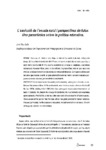Mostrar o rexistro simple do ítem
L'evolució de l'escola rural i perspectives de futur: una panorámica sobre la política educativa
| dc.contributor.author | Feu Gelis, Jordi | |
| dc.date.accessioned | 2011-07-12T11:33:07Z | |
| dc.date.available | 2011-07-12T11:33:07Z | |
| dc.date.issued | 2000 | |
| dc.identifier.citation | Sarmiento Anuario galego de historia da educación, 2000, 4: 83-97. ISSN: 1138-5863 | es_ES |
| dc.identifier.issn | 1138-5863 | |
| dc.identifier.uri | http://hdl.handle.net/2183/7746 | |
| dc.description.abstract | [Abstract] Rural education in this country has fortunately undergone a favorable evolu- tion over the course of time. While rural schools were, in many aspects, impoverished until the late 1970s, starting in the 1980s they have undergone considerable improvement, at least in Cataluña. Yet, despite this change for the better, the rural school is not completely up to standards. Proof of this is that year alter year rural schools close for different reasons. Since we are of the opinion that the rural school has great potential for human relations- hips and particularly, for the purpose of education, we put have forth a number of different strategies to promote rrs consolidation. | es_ES |
| dc.language.iso | cat | es_ES |
| dc.publisher | Universidade da Coruña | es_ES |
| dc.title | L'evolució de l'escola rural i perspectives de futur: una panorámica sobre la política educativa | es_ES |
| dc.type | info:eu-repo/semantics/article | es_ES |
| dc.rights.access | info:eu-repo/semantics/openAccess |






